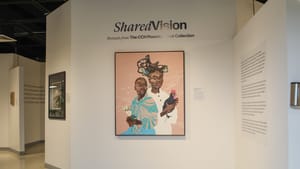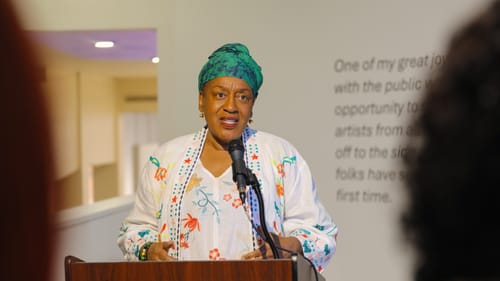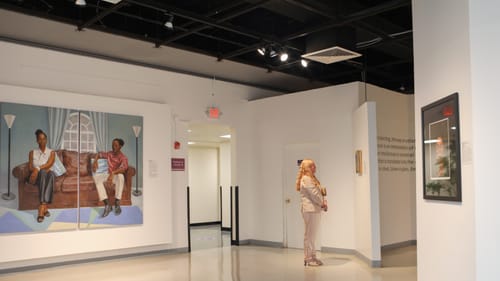Stay in the Loop
BSR publishes on a weekly schedule, with an email newsletter every Wednesday and Thursday morning. There’s no paywall, and subscribing is always free.
Honoring Black women who look up and out
The African American Museum in Philadelphia presents Shared Vision: Portraits from the CCH Pounder-Koné Collection

Acting powerhouse CCH Pounder teams up with the African American Museum in Philadelphia for an exciting and exclusive look at her personal art collection. Shared Vision: Portraits from the CCH Pounder-Koné Collection, running through March 2025, features work that subverts old-school portraiture techniques that objectified the female subject or subjugated the Black one. Every portrait within this collection portrays Black female figures as socially significant—rather than looking down, each woman looks out and up.
An actor and patron of the arts
I have followed Pounder’s career (including many Emmy, Grammy, and NAACP Image Award nominations) since my teens. Since the 1970s, she has voiced and starred in a huge number of sci-fi, action, medical, and legal dramas, including Hill Street Blues, NCIS: New Orleans, The Shield, X-Files, ER, Warehouse 13, Law & Order: SVU, The Good Fight, and Avatar. She also belongs to the DC Universe’s cultural juggernaut, voice acting in the Justice League Universe series. She has always played intelligent and emotionally profound characters with gravitas and grace. As a young African American woman, I felt pride seeing a Black woman play unabashed high-status figures with measured temperaments.

This AAMP exhibition alerted me to Pounder’s background in the visual arts. A patron, collector, and gallery and museum founder, she established the Musee Boribana in Senegal with her husband, Boubacar Koné (which he later willed to the country upon his death). Thank goodness AAMP reached out to Pounder to bring her traveling Queen exhibition to Philly and double thank goodness the partnership morphed into a new exhibition altogether. The art shows Black women not as people see us, idealize us, or deprecate us, but as we are. The collection shares the same grounded gravitas Pounder brings into each of her characters.
Reversing historic objectification
Similar to the way England’s National Portrait Gallery typically portrays white male figures as significant, intelligent, and established, Pounder’s collection creates her own Black female portrait gallery with the same perspective. Each piece spoke to me aesthetically while also subverting the historical subjugation of women of color in paintings. Typically, 17th- and 18th-century English portraiture portrayed women as objects of visual pleasure to the viewing audience, or as a gendered accessory to the primary male subject. This trend covertly carries over to Black women even in contemporary paintings, especially if the artists are not female or Black.
My biggest complaint about the Delaware Art Museum’s spring 2024 show There Is a Woman in Every Color was that two-thirds of the Black female nudes were photographed by men (including white artist William Witt) and appeared to sexualize the subject. I do not feel that in Pounder’s collection.

Sahara Longe’s Just Having a Think nude catches a couple lounging. While the woman is clearly the primary subject, she is not naked by herself. Additionally, her body is just that: a body without over-sexualization. Tylonn Sawyer’s mixed media on paper, Strata III: Pangea, reclaims Sarah “The Black Venus” Baartman from 19th-century fetishization. Greg Bailey’s Mushroom Clouds portrays a middle-class Black family in turmoil. But unlike most paintings that might highlight violence or female subservience, the female subject looks out unbowed and sits slightly higher while the man looks at her and places lower. Candace Hunter’s 21st Century Pieta further flips the script, leaning into the Black woman as rescuer with the sacrificial body of George Floyd held by a brown-skinned Mary figure. Bailey’s Lady Locke and Lady Hamilton further cement Black women as aristocratic powers by showcasing bewigged Black female barristers similar to 17th-century white male portrait subjects.
A show for women, and everyone else
Where else can we have a dab of Hollywood glamour in our Philly lives? The pieces I mention here are a drop in the bucket of the wonders of this significant, uplifting collection, which fills the second and third floors of AAMP’s gallery area (the third-floor displays boast additional striking wall-size portraits). This is a phenomenal collection featuring phenomenal women … phenomenally. And a multi-media interview display shares insight into Pounder’s artistic background.
While I feel women (especially younger generations) should see this collection of international artists, EVERYONE should see this. Pounder has been a significant inspiration in my life through her character portrayals. I love that she continues to positively influence me through her art selections. I hope there’s a coffee table book in the making for this exhibition.
What, When, Where
Shared Vision: Portraits from the CCH Pounder-Koné Collection. $10-$14. Through March 2, 2025, at the African American Museum in Philadelphia, 701 Arch Street, Philadelphia. (215) 574-0580 or aampmuseum.org.
Accessibility
AAMP is a wheelchair-accessible venue. For specific access needs, contact the museum at (215) 574-0380.
Sign up for our newsletter
All of the week's new articles, all in one place. Sign up for the free weekly BSR newsletters, and don't miss a conversation.

 An Nichols
An Nichols